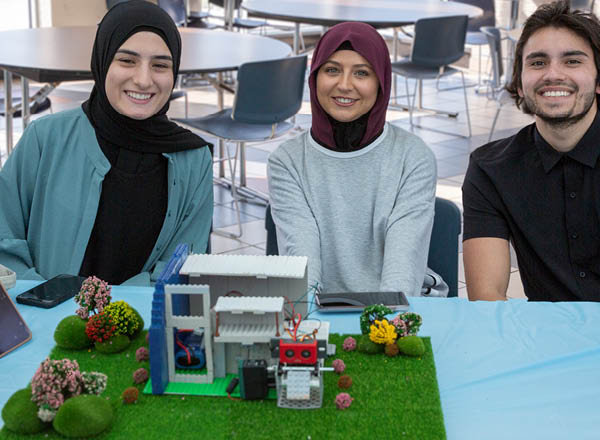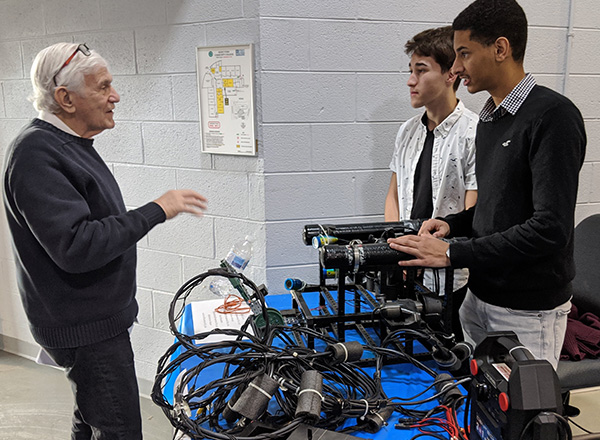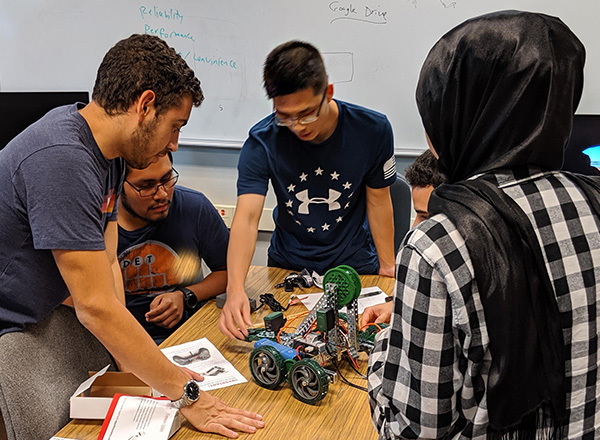Careers to Consider: Engineering

This article is part of a series spotlighting HFC academic and workforce programs leading to great careers. To view all HFC programs, visit this link.
HFC’s pre-engineering program covers the first two years of a bachelor of science degree in engineering for nearly all types of engineering programs.
Engineering is an exciting career filled with opportunities to solve problems and make the world a better place. Almost every manufactured thing you can see – cars, bridges, cell phones, aviation, technology, the built environment – involved an engineer at some point in its creation. Whatever type of engineering you are interested in, you can have great success starting with HFC's Pre-Engineering program.
Get started changing the world
As one of the next generation of engineers, you will change the world in ways we can only imagine. Solving complex problems in engineering requires a high level of mathematical understanding. If you plan to pursue a career in this field, we recommend you focus on mathematics classes in high school. The great news is, HFC has an amazing math faculty who can help you excel in math no matter what your starting point is.
In pre-engineering, students take physics and math courses, as well as general education courses required by most engineering schools. Here is the recommended sequence of courses for the pre-engineering program, beginning with CHEM 141: Principles of General and Inorganic Chemistry I.
You can pursue engineering careers in the following areas, and others:
- Aerospace Engineering
- Biomedical Engineering
- Chemical Engineering
- Computer and Electrical Engineering
- Industrial Engineering
- Mechanical Engineering
- Civil Engineering (including structural, transportation, environmental, geotechnical, urban planning, and water resources)
- Robotics
- Teaching Engineering at the high school, college, or graduate school level
How should you set up your class schedule?
We always recommend you talk to one of our friendly, expert advisors to make sure you are on the right track.
“We offer specialty Pre-Engineering programs for students who would like to take additional courses in mechanical, industrial, electrical, or computer engineering,” said HFC Pre-Engineering Director Dr. Hassan Nameghi. “Elective courses required for the different majors may vary slightly, which is why students need to meet with an advisor to make sure you register for the right classes.”
What you will learn
After successfully completing this program, you should be able to:
- Describe the theories and principles of engineering physics in mechanics, gravitation, electricity and magnetism, wave motion, and physical optics
- Apply standard methods of mathematical analysis, including trigonometry and analytic geometry, differential and integral calculus, and the solutions to differential equations
- Name the general concepts of chemistry, including atomic and molecular structure, the laws of thermodynamics, and energy exchange
- Demonstrate the ability to work in a team environment to successfully follow a design process or build a prototype
- Use a computational engineering programming tool to solve engineering problems
- Demonstrate professional ethics appropriate to the field of engineering
- Understand the roles of different engineers and select your engineering major and school
Transfer agreements with numerous universities
After you complete the pre-engineering program, you can transfer to a 4-year educational institution to earn your bachelor's degree in 2 years. HFC has several articulation agreements with 4-year educational institutions such as (and there are many more options):
- Wayne State University
- Eastern Michigan University
- Oakland University
- Michigan Technological University
- The University of Michigan - Dearborn
- The University of Michigan - Ann Arbor
Nameghi is working on articulation agreements with many more 4-year educational institutions. You may also transfer to any university in the nation if you investigate their academic requirements and make sure your courses will all transfer seamlessly.
For questions or more information, contact Nameghi at 313-317-1746 or hnameghi@hfcc.edu.

